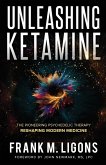Ketamine has a special position among anesthetic drugs. It was introduced into clinical practice more than 30 years ago with the hope that it would function as a "monoanesthetic" drug: inducing analgesia, amnesia, loss of consciousness, and immobility. With the introduction of other IV anesthetic drugs, ketamine's role diminished rapidly. However, it is still used clinically for indications such as induction of anesthesia in patients in hemodynamic shock; induction of anesthesia in patients with active asthmatic disease; IM sedation of uncooperative patients, particularly children; supplementation of incomplete regional or local anesthesia; sedation in the intensive care setting; and short, painful procedures, such as dressing changes in burn patients. It has been concluded that Ketamine is as good as tramadol for the prophalaxis of intraoperative Shivering with less side effects.
Bitte wählen Sie Ihr Anliegen aus.
Rechnungen
Retourenschein anfordern
Bestellstatus
Storno








